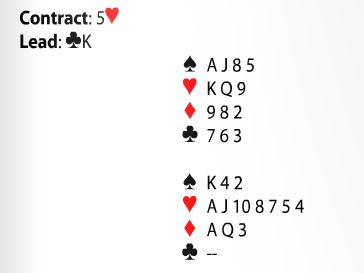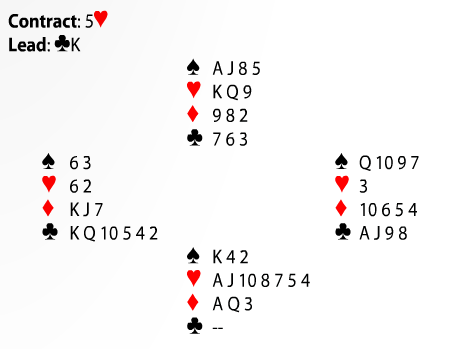Source: Bridge Canada Magazine
Deep Finesse is a well-known hand analyzer that plays perfect double-dummy bridge. If a contract can be made, Deep Finesse will make it. Every so often a bridge hand gives one a chance to match Deep Finesse.
Whenever you reach a good contract, no matter how rosy it appears, always analyze the situation to look for a 100% line of play which guarantees success.

The natural first thought of most players is to wonder whether they should have been in slam. Some proceed forgetting that the actual contract is 5![]() , not 6
, not 6![]() ! For the rest of us, the play might progress in the following way:
! For the rest of us, the play might progress in the following way:
Declarer ruffs the opening lead and plays one round of hearts. The hearts are not 3-0.
The inexperienced player draws trumps and finesses for the ![]() Q. If that fails he/she hopes the
Q. If that fails he/she hopes the ![]() K is onside or that spades break 3-3. Heavy odds that the contract will make, but not 100%.
K is onside or that spades break 3-3. Heavy odds that the contract will make, but not 100%.
An intermediate player recognizes that the spade suit will generate 3 tricks as long as he plays ![]() A,
A, ![]() K and then leads a spade towards the Jack. This line avoids losing to the doubleton Queen offside and still leaves open the possibility of scoring two diamond tricks. A more advanced player recognizes that some additional chances may materialize if he eliminates clubs before playing spades.
K and then leads a spade towards the Jack. This line avoids losing to the doubleton Queen offside and still leaves open the possibility of scoring two diamond tricks. A more advanced player recognizes that some additional chances may materialize if he eliminates clubs before playing spades.
The sequence of plays might be: ruff the opening club lead, travel to dummy with the ![]() K, ruff a club, travel to dummy’s with
K, ruff a club, travel to dummy’s with ![]() 9 to ruff the last club and, only then, play
9 to ruff the last club and, only then, play ![]() A,
A, ![]() K and a low spade towards the Jack.
K and a low spade towards the Jack.
Bring on Deep Finesse (or an expert who looks deeper and spots a line of play that guarantees the contract). After ruffing the initial club lead, he travels to dummy with the ![]() K, ruffs a club, draws the last trump with the ace, and then plays
K, ruffs a club, draws the last trump with the ace, and then plays ![]() K and
K and ![]() A. If the
A. If the ![]() Q has not dropped, he leads dummy’s last club and pitches his last spade.
Q has not dropped, he leads dummy’s last club and pitches his last spade.
Notice the effect. Regardless of the spade and diamond positions, it doesn’t matter which opponent wins the cheap club trick because either defender is endplayed. If West wins, any continuation surrenders a trick immediately. So East must win. If East then leads a spade, declarer will pitch a diamond and later pitch the ![]() Q on the
Q on the ![]() J. If, instead, East leads a low diamond, declarer plays low and West is endplayed since a diamond return concedes the tenth trick and a spade return allows declarer to cover in dummy. Suppose East wins the club trick and leads the
J. If, instead, East leads a low diamond, declarer plays low and West is endplayed since a diamond return concedes the tenth trick and a spade return allows declarer to cover in dummy. Suppose East wins the club trick and leads the ![]() J or
J or ![]() 10? Declarer covers with the
10? Declarer covers with the ![]() Q and poor West is endplayed as before. The four hands:
Q and poor West is endplayed as before. The four hands:

Experts may seem to be luckier than other players, but in fact, they simply know how to take full advantage of all the opportunities. They concentrate on being Deep Finesse!
